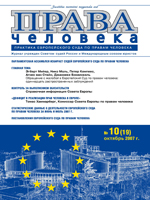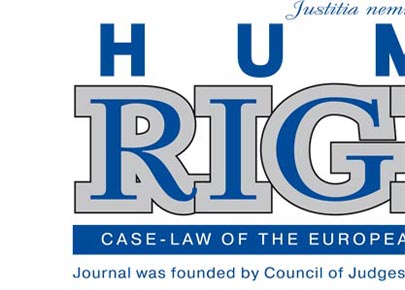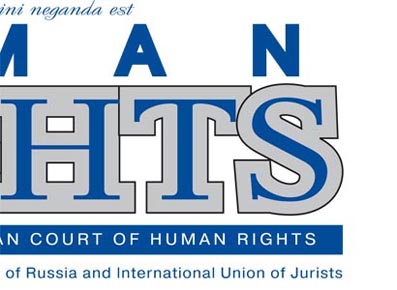
№10 (19)
By the Decree of the Russian Federation President No. 1219, 24 September 2007,
with a view to advance representation of the Russian Federation before the European
Court of Human Rights, the Ministry of Justice of the Russian Federation is authorised,
in order to provide for the activity of the Russian Federation Representative before
the European Court of Human Rights, to assign up to five staff officials to fulfil their
functions being attached to the Permanent Representation of the Russian Federation
to the Council of Europe.
Opening in Strasbourg of the «permanent representation» of the Russian Federation
Representative before the European Court of Human Rights will undoubtedly not only
allow to deal with cases against the Russian Federation more efficiently, but will also
open much wider opportunities for the Russian Federation Representative to see into
cases against other Contracting States. It will also help to organise — more effectively
— the activity with a view to bring the jurisprudence of the Court with respect to other
Contracting States to the notice of Russian law-application bodies and officials.
The Council of Europe Parliamentary Assembly (PACE) meeting in plenary session
in Strasbourg elected twelve judges to the European Court of Human Rights on 2
October 2007. Judges are elected by the Parliamentary Assembly of the Council of
Europe from lists of three candidates nominated by each State which has ratified the
European Convention on Human Rights. Under the present terms of the Convention,
judges are elected for six years and can be re-elected. The procedure is valid until the
Russian Federation ratifies the Protocol No. 14 to the Convention. Before 1 February
2008, PACE has to elect nine more judges in respect of nine countries, the judges
whose terms expire in view of the current procedure.
In this issue of the journal, we offer the press release by Registrar of the European
Court Erik Fribergh about election of judges of the European Court of Human Rights.
The term of six re-elected judges begins on 1 November 2007 and ends on 31 October
2013. New judges were also elected. Their terms begin on 1 February 2008 and end
on 31 January 2014. Half of the new judges work with the Council of Europe’s Venice
Commission (European Commission for Democracy through Law).
There is no doubt that such a substantial replacement in the European Court’s
composition will complicate its operations. Time is needed that the new judges fully
catch up with the hard tempo of the European Court.
The featured topic of the issue is the article by the Dutch jurists wherein they analyse
common misconceptions while submitting a complaint to the European Court of
Human Rights and explain how to avoid mistakes in doing it.
In this issue, as customary, we publish translations of judgments by the European
Court. Special attention should be drawn to the case of Tuleshov and Others v. Russia.
The applicants in the case, bona fide purchasers, were evicted from the house they had
purchased at the public auction. The applicants referred to violations of Article 1 of
the Protocol No. 1 to the Convention. The European Court considered the applicants’
case to be quite substantiated.
In this issue, we also publish translations of two judgments by the European Court in
cases against the United Kingdom. Those are the cases of life and death, i.e. the matters
of how to give life and how to give death. Both judgments have their advocates and
opponents. However these are determinations by the European Court of precedential
nature and they are to be taken into consideration by those who apply the law.
In this regard, it is worth recalling the interview of Mr Valery D. Zorkin, the President
of the Russian Federation Constitutional Court, published in the previous issue of our
journal. Mr Valery D. Zorkin stated that judgments by the European Court construing
provisions of the Convention are of universal precedential value for all countries
participating in the Convention and the Court’s legal approaches pertaining to the
interpretation of the Convention are erga omnes rules.
Vitaly Portnov
 Back
Back
Content 



